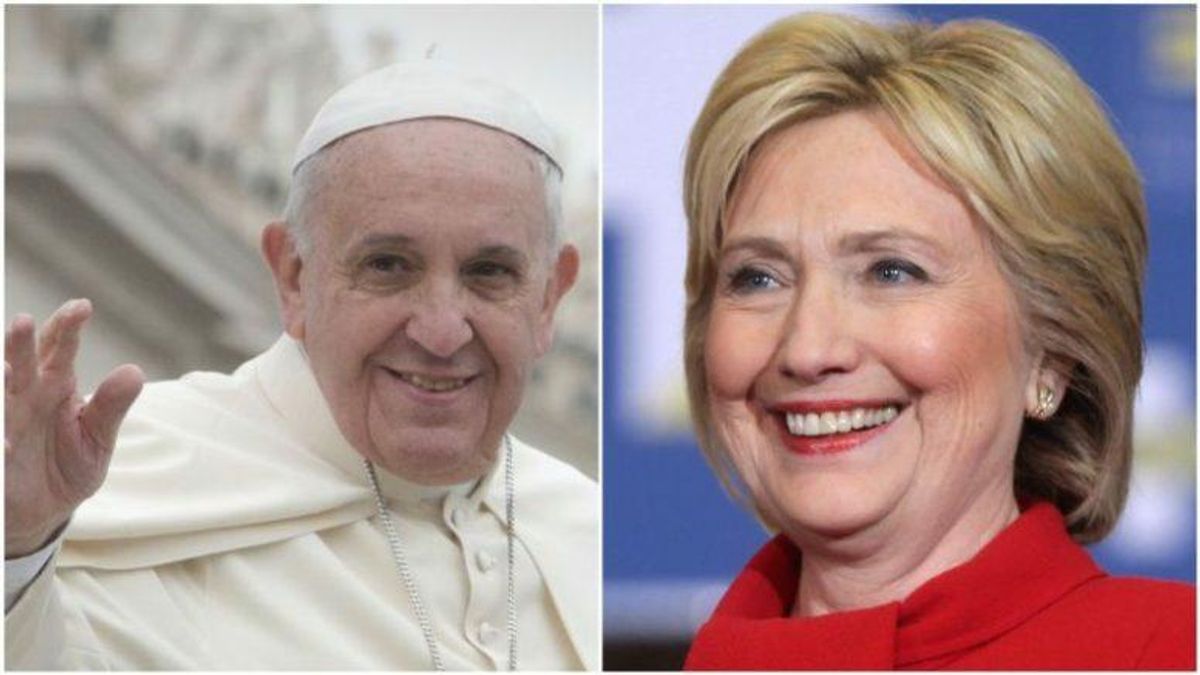On 20 October 2016, the web site Tell Me Now published a constitutionally misleading article reporting that Pope Benedict XVI forbade Catholics from voting for Hillary Clinton, the 2016 Democratic presidential nominee:
Cardinal Ratzinger, who became Pope Benedict XVI in 2005 and served through 2013, wrote a blistering letter in 2004 forbidding Catholics from voting for pro-abortion Hillary Clinton or anyone who espouses her ideas.
The article was popular on social media, where users often share an article based on its headline alone. Although the headline specified Pope Benedict XVI (who resigned in early 2013), many readers inferred that a recent papal edict had been issued by Pope Francis (the current pope).
But the current Pope did not forbid anything of the sort, nor did the referenced 2004 letter from Cardinal Ratzinger (written prior to his elevation to papal status). Clinton was mentioned nowhere in that letter, which said the opposite of what the rumor claimed:
Presenting oneself to receive Holy Communion should be a conscious decision, based on a reasoned judgment regarding one’s worthiness to do so, according to the Church’s objective criteria, asking such questions as: "Am I in full communion with the Catholic Church? Am I guilty of grave sin? Have I incurred a penalty (e.g. excommunication, interdict) that forbids me to receive Holy Communion? Have I prepared myself by fasting for at least an hour?" The practice of indiscriminately presenting oneself to receive Holy Communion, merely as a consequence of being present at Mass, is an abuse that must be corrected (cf. Instruction "Redemptionis Sacramentum," nos. 81, 83).
The Church teaches that abortion or euthanasia is a grave sin. The Encyclical Letter Evangelium vitae, with reference to judicial decisions or civil laws that authorize or promote abortion or euthanasia, states that there is a "grave and clear obligation to oppose them by conscientious objection. [...] In the case of an intrinsically unjust law, such as a law permitting abortion or euthanasia, it is therefore never licit to obey it, or to 'take part in a propaganda campaign in favour of such a law or vote for it’" (no. 73). Christians have a "grave obligation of conscience not to cooperate formally in practices which, even if permitted by civil legislation, are contrary to God’s law. Indeed, from the moral standpoint, it is never licit to cooperate formally in evil. [...] This cooperation can never be justified either by invoking respect for the freedom of others or by appealing to the fact that civil law permits it or requires it"
[N.B. A Catholic would be guilty of formal cooperation in evil, and so unworthy to present himself for Holy Communion, if he were to deliberately vote for a candidate precisely because of the candidate’s permissive stand on abortion and/or euthanasia. When a Catholic does not share a candidate’s stand in favour of abortion and/or euthanasia, but votes for that candidate for other reasons, it is considered remote material cooperation, which can be permitted in the presence of proportionate reasons.]
Cardinal Ratzinger wrote a letter (not an edict to all Catholics) in 2004 regarding ecumenical stances on politics. The letter in question pertained to worthiness to receive Holy Communion, not Hillary Clinton, and in the non-papal letter Cardinal Ratzinger asserted that although Catholics should be opposed to abortion and euthanasia, their voting for a candidate with differing stances on those issues "can be permitted in the presence of proportionate reasons" (i.e., if their support for that candidate is based on other issues).
Pope Francis himself has issued no letter or edict barring Catholics from voting for Hillary Clinton, and no command from the Vatican prevents American Catholics from freely choosing between candidates in the 2016 presidential election for fear of going against the Church. Pope Francis specifically declined to endorse either Donald Trump or Hillary Clinton in the 2016 election, directing Catholics in October only to "[s]tudy the proposals well, pray, and choose in conscience."
However, back in February 2016 the Pope described Trump's proposals to deport more immigrants and force Mexico to pay for a wall along the border as "not Christian," a statement he later tempered when pressed. Trump accused Pope Francis of making the remarks at the behest of Mexico, a comment that elicited laughter from the Pope:
Asked whether he would try to influence Catholics in how they vote in the presidential election, Francis said he “was not going to get involved in that” but then repeated his criticism of Mr. Trump, with a caveat.
“I say only that this man is not Christian if he has said things like that,” Francis said. “We must see if he said things in that way and in this I give the benefit of the doubt.”
Asked about [Trump's] comments, Francis laughed. “Thank God he said I was a politician because Aristotle defined the human person as ‘animal politicus,’ ” he said.
“So at least I am a human person,” the pope said. “As to whether I am a pawn, well, maybe, I don’t know. I’ll leave that up to your judgment and that of the people.”

